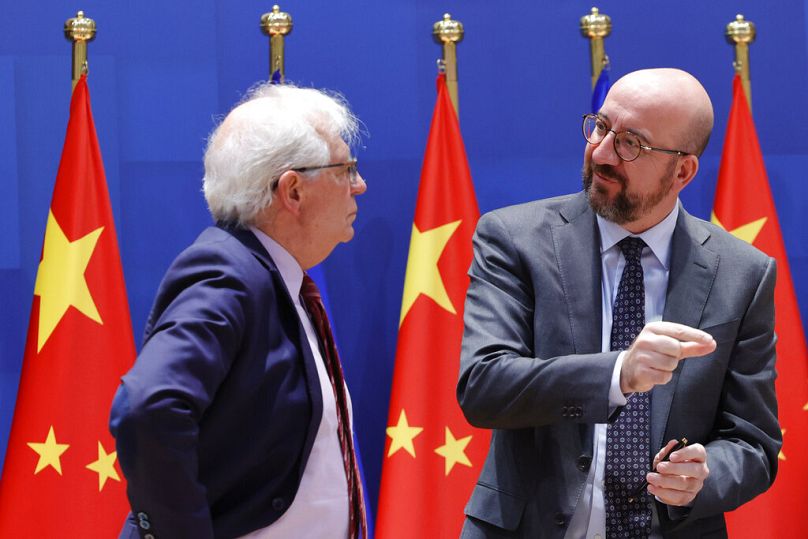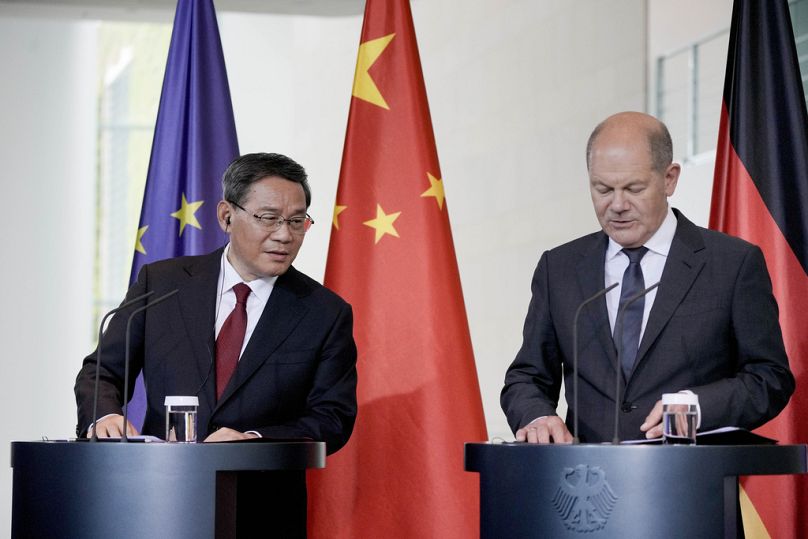The polycrisis engulfing the world today reveals a broken multilateralism that beckons both Brussels and Beijing to have the will to embark on a journey towards change, Lucie Qian Xia writes.
Coinciding with US Secretary of State Antony Blinken’s visit to Beijing, the first official visit to China by a US top diplomat in five years, Chinese Prime Minister Li Qiang has gone on his first overseas visit abroad since taking office — a high-level mission to Germany and France, the two most important member states of the EU.
In an increasingly contested geopolitical world dominated by growing technological competition blurring the boundaries between economy and security, these two high-level missions underscore the imperative for international cooperation, garnering much spotlight on the pas de trois of the EU, China and the US on the world stage.
While Blinken’s visit was to rescue the US-China relationship from the mire, Li’s visit intended to reify EU-China relations.
It’s the world’s second-largest economic relationship
Forging EU-China strategic resilience is the pathway to not only “de-risk” but enhance the Sino-European relationship now and into the future.
At the recent EUISS annual conference, EU High Representative Josep Borrell stated that the world is morphing towards a bipolarity coupled with “messy multipolarity”, and Europe must have the “ambition to be a pole — and act as one”.
The EU and China form the second-largest economic relationship in the world, trading over €2 billion each day.

It is a strategic imperative to ensure that both China and the EU are poles in a multipolar world.
Since the establishment of formal diplomatic ties in 1975, and especially since the establishment of the EU-China Comprehensive Strategic Partnership in 2003, EU-China relations have intensified and expanded.
The EU and China form the second-largest economic relationship in the world, trading over €2 billion each day. The relationship shouldn’t be controlled or pressured by any third country.
The relationship is at an inflection point
The impression that the EU is caught between a superpower rivalry needs to be spelt out with greater granularity.
The EU has long aspired to be a stronger geopolitical actor, even becoming the first major economy to set out a strategy on economic security just last week, its actorness should and would rely heavily on a more coherent foreign and security policy.
However, the EU’s strength lies primarily in its economic, financial and technological power and diplomatic tradition and moral influence.
The relationship has reached an inflexion point: whether it will gravitate towards more periods of cooperation or moments of contention will be determined by strategic engagement.

Sole transatlantic cooperation does not sufficiently substitute for strengthening the arsenals to pursue and defend Europe’s interests and values, and fundamentally Europe would lose its ability to influence policy not only in Beijing but also in other emerging economies.
Despite the EU’s shift to a more critical China policy occurring over the past few years, the EU still sees Beijing as a partner essential to address global challenges and crises, given China’s economic power and political gravitas.
China has reiterated support for the EU’s strategic autonomy. The country’s State Council recently stated that China has made developing relations with the EU a “top priority” in its foreign policy, as Brussels is a “strategic force” in the international arena.
The relationship has reached an inflexion point: whether it will gravitate towards more periods of cooperation or moments of contention will be determined by strategic engagement.
It’s imperative to avoid destabilising relations around disagreements
EU-China resilience would need to prioritise addressing the asymmetries in the relationship via a dual focus on high-level diplomacy and robust working group engagement.
Across the vast spectrum of EU-China relations, the degree of cooperation and depth of engagement varies depending on the policy area.
Trade has been the anchor of the relations between the two. It has developed amidst varying challenges over the past decade, while EU-China digital and science diplomacies have developed significantly over the years.

How both sides adjust actions to avoid destabilising relations in areas of disagreement, preventing negative spillover effects across policy issues, would be critical to enhance the EU-China relationship.
EU-China relations consist of a web of exchanges operating at multiple echelons, from the highest levels of summitry to various mid-level and low-level ties.
Below the highest level of summit diplomacy is the five high-level dialogue mechanism: the EU-China High-Level Strategic Dialogue, High-Level Economic and Trade Dialogue, High-Level People-to-People Dialogue, High-Level Environment and Climate Dialogue and the High-level Digital Dialogue.
Under these high-level dialogues is the flourishing area of working-level exchanges on sectoral policies and technical issues or, as they are known, “sectoral dialogues” between China and the EU.
There are more than 70 sectoral dialogues between the EU and China operating as of now.
These sectoral dialogues take place from the technical level to the ministerial level and involve a range of participants, including, inter alia: diplomats, government officials, and stakeholders from the business, research and civil society communities.
A journey towards change
EU-China strategic engagement would need to establish a strong synergistic mechanism with regular summitries providing strategic direction that can orient technical cooperation and technical-level discussions feeding into the political dialogues.
Henry Kissinger wrote, “Every international order must sooner or later face the impact of two tendencies challenging its cohesion: either a redefinition of legitimacy or a significant shift in the balance of power.”
The polycrisis engulfing the world today reveals a broken multilateralism that beckons both Brussels and Beijing to have the will to embark on a journey towards change.
The two must strengthen coordination and collaboration to contribute to the making of a multipolarity with a functioning multilateral system.









